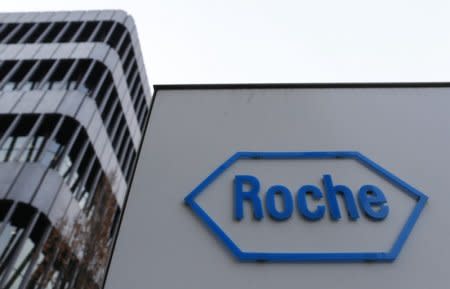Roche takes on Loxo, Bayer in gene-defined cancer class

Thomson Reuters
MUNICH (Reuters) - Roche's entrectinib cancer pill was shown to shrink tumors in 57 percent of patients within a group that can only be identified via genetic profiling, as the Swiss drugmaker challenges an alliance of Bayer and Loxo Oncology in a new targeted treatment area.
The trial results on patients with a gene anomaly known as NTRK fusion, which occurs in less than 1 percent across a range of tumor types, were presented at the annual congress of the European Society for Medical Oncology (ESMO) in Munich on Sunday.
Germany's Bayer and U.S. partner Loxo, in turn, released data for their rival compound larotrectinib, which slightly improved on previous high-efficacy readings in an enlarged trial.
Traditionally, oncologists have made treatment decisions based on where in the body a tumor started, increasingly helped by the growing knowledge of cancer's complex genetic drivers.
Under the tumor-agnostic approach, also known as pan-tumor, drugmakers skip the organ-of-origin perspective and regroup patients based only on signature genetic mutations, but success in real life will depend on the fast spread of comprehensive gene-sequencing tools for tissue samples.
Individually, the mutations are so rare that cancer units are seen as unlikely to run dedicated tests for each.
Roche's Foundation Medicine supplies the comprehensive kits, competing with Thermo Fisher Scientific and Caris Life Sciences.
"It's one of the reasons we acquired Foundation Medicine, to make this comprehensive genomic profiling routine and upfront in the course of the disease," said Daniel O'Day, the head of Roche's Pharmaceuticals division.
Loxo's larotrectinib pill, co-developed with Bayer, was last year shown to shrink tumors in 75 percent of patients with the NTRK fusion gene anomaly, occurring in the lung, pancreas, or more than a dozen other organs.
On Sunday, the response rate to larotrectinib within an enlarged group of 122 trial participants - up from 55 initially and now spanning 24 tumor types - was shown to be 81 percent.
Roche said the readings from the two NTRK fusion trials were not comparable because they are made up of different patient types. Loxo's study, for instance, included some cancers in children, while Roche plans to investigate those separately.
The Roche compound is designed to tackle several oncogenic mutations and last month, it unveiled data https://www.roche.com/media/releases/med-cor-2018-09-24c.htm on entrectinib pushing back tumors in 77 percent of lung cancer patients with a mutation called ROS1.
Merck & Co's Keytruda in May last year became the first drug to win approval for pan-tumor use, though that remains a relatively small market for the mega-selling drug. Bayer and Loxo are testing a second pan-tumor drug, LOXO-195.
Roche Pharmaceutical's O'Day welcomed a wider field.
"Both things have to happen: You need genomic profiling and you need enough targeted medicines to encourage physicians to make that diagnosis upfront very complete. This is the world we're entering," he said.
Though response rates could encourage a race for more such drugs, the need for suitable gene mutations or fusions will be a tall order, said oncologist Ulrik Lassen of Copenhagen's Rigshospitalet, who co-authored the larotrectinib study.
"You need to screen a lot of patients to find the needle in the haystack and the method is complicated, costly and time-consuming. When we get better at using these technologies, we can find more oncogenic fusions and companies will be smart enough to find the agents that target them."
Roche acquired entrectinib as part of its takeover deal with U.S. cancer drug specialist Ignyta Inc for $1.7 billion, agreed in December last year.
Immuno-oncology remains another major business area for Roche, which also released positive results on using its Tecentriq drug in a group of breast cancer patients with a particularly poor prognosis.
(Reporting by Ludwig Burger; Editing by Dale Hudson)
See Also:

 Yahoo News
Yahoo News 
